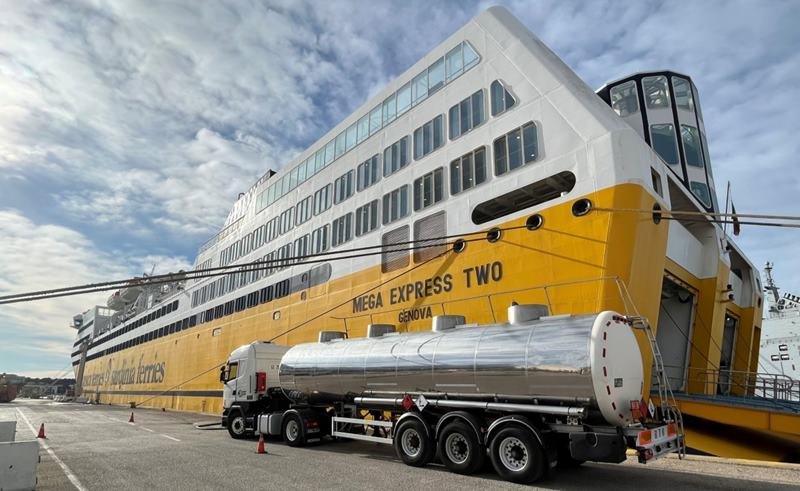TotalEnergies Marine Fuels completed its first biofuel bunkering trials in France following the success of similar tests in Singapore last year which led to the commencement of commercial operations.
The launch of these biofuels activities underscores TotalEnergies Marine Fuels commitment to contribute to the decarbonization of the shipping industry, by developing a suite of low-carbon fuels, including liquefied natural gas (LNG), bio-methane, e-methanol and e-ammonia amongst others.
Two biofuel bunker operations took place in January 2023 in France.

In the first trial, at the Port of Le Havre, the TotalEnergies-chartered tanker “Minerva Tychi” was supplied with 200 MT of a bio-marine gas oil (MGO) blend on January 3rd. The blend was composed of MGO and 30% second-generation, sustainable, waste-based and ISCC-certified UCOME (Used Cooking Oil Methyl Ester), via truck-to-ship transfer.
The operation marks the first biofuel bunker operation that was completed at the French port. It was also notable because it leveraged TotalEnergies company-wide resources to set up a local marine biofuel supply chain, from the sourcing of bio-feedstock to the provision of logistics and blending solutions and the eventual bunker delivery to the tanker.
In the second trial, TotalEnergies and Corsica Ferries joined forces and successfully completed the first biofuel bunker operation in the French Mediterranean. During the bunkering in the Port of Toulon, Southern France, 100 MT of biofuel comprising MGO blended with 30% second-generation, waste-based and ISCC-certified UCOME (Used Cooking Oil Methyl Ester) was transferred via truck-to-ship operations to the 26,000 tonne Ro-Ro/Passenger ship, “Mega Express Two”.
“We are proud to be first movers in marine biofuels in the Port of Le Havre and in the French Mediterranean,” said Louise Tricoire, Vice President of TotalEnergies Marine Fuels. “These operations follow the launch in January of our first commercial biofuel bunkering operation in Singapore with Hapag-Lloyd. Importantly, these trials underline our ambition and our readiness to expand our biofuels offer to our customers across Europe and beyond, to help support the growing decarbonization goals of the global shipping industry.”
Biofuels can help reduce emissions released by existing vessels because they can be blended or dropped into existing conventional fuels with little or no technological developments required on vessels. Depending on the proportion of bio-component one can blend, biofuels can provide a GHG emissions savings up to 90% from a well-to-wake approach.
It also provides a viable, cleaner fuel option for ships in the Mediterranean Sea to align with tighter sulphur limits, when International Maritime Organization (IMO) regulations take effect as part of the region’s new Emission Control Area (ECA) designation in 2025.
As part of TotalEnergies strategy to produce a new generation of biofuels for use in transport, TotalEnergies is investing in biofuels projects based on advanced feedstock, thereby sourcing from the circular economy and limiting the competition for and impact on arable land. Through the Company’s bio-refineries, technology and R&D centres, future marine biofuels and associated lubricants & additives are currently undergoing tests to increase the overall engine performance. The goal is to launch these advanced biofuel blends into trial operations in the near future.
Louise noted, “With the shipping industry’s growing interest for biofuels, we see biofuels potentially accounting between 3 to 5% of the global bunker fuel mix by 2030 and for leading ports, this percentage could go way above. Our aim is to be the bunker supplier of choice in our shipping customers’ decarbonization pathways.”
Source TotalEnergies Marine Fuels

